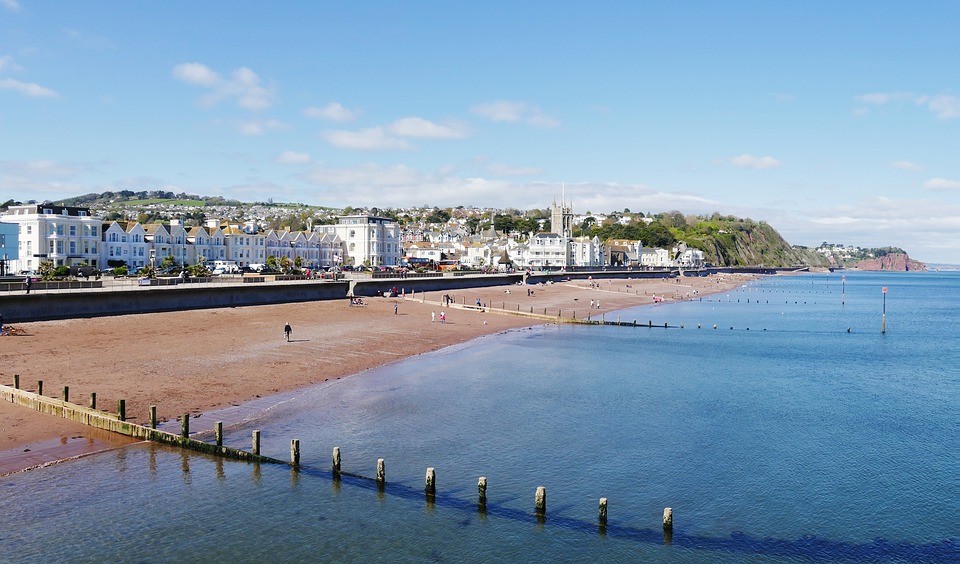When John Keats came to Devon do you think someone upset him? He may have been one of the Romantics but there was nothing romantic in his comments at the time. In a letter to a friend, he calls Devon a splashy, rainy, misty, snowy, foggy, haily, floody, muddy, slipshod county.
He writes; ‘The hills are beautiful when you can see them. The primroses are out but you are in and the fine coloured cliffs vie with the clouds. The women like London people but only because the Devon men are the poorest creatures in England.’
Keats has certainly got it in for the men. He says that if he were a pirate he’d make straight for the south Devon coast and adds, ‘What a good thing Julius Caesar didn’t land here first.’ In his final comment he says; ‘A Devon man standing on a hillside would not be a distinct object he would not show against the light a wolf or two would dispossess him.’
Well, we have plenty of Devon men who could put him right today! However, being a charitable community we might concede that there were mitigating circumstances for this outburst. (Bad weather was one and we know all about that!)
Keats was anxious about his brother Tom who was suffering with tuberculosis. Brother George had brought Tom to stay in Teignmouth to boost his constitution in the wonderful climate. Eventually George had to return to London to finalise his plans for marriage and emigration. Keats felt that Tom shouldn’t leave and immediately travelled to Teignmouth to be with him. He was looking forward to relaxing with Tom and probably imagined pleasurable walks and carriage rides and the chance to find inspiration for his writing. He joined Tom in a small house in Northumberland Terrace, close to the quay – and then the weather closed in!
It was the poor weather that set Keats off on his fault-finding tirade. In those days people had great expectations of their visit to the south coast. Pamphlets advertised it as a region that promised a mild climate and untold benefits from healthy living. It’s all too easy to imagine how disappointed Keats felt when he looked out of the window each day and saw rain. He was also harbouring the sadness of knowing that George would soon be leaving England for good.
John Keats, George, Tom and their sister Frances were orphans. Their father died in a riding accident when Keats was eight and six years later their mother died. Their maternal grandmother appointed two men as guardians and Keats was taken out of school and sent as an apprentice to an apothecary surgeon. Later he worked at Guy’s Hospital but finally decided that surgery was not for him. As he sliced into bodies he noticed that his mind had a tendency to wander! He daydreamed of landscapes and flowers and fairies. When he returned to reality he was amazed to find that he’d been involved in a successful operation!
Keats was eager to study literature and eventually embarked on a literary lifestyle of his own. But the critics condemned his first work. The media turned against him and had a field day. It was an humiliating experience and an added burden for Keats. So we can see that his circumstances didn’t encourage him to be the life and soul of the party in Teignmouth! He did like the women there and he and his brothers made friends with a Mrs Jeffery and her daughters. One last excuse we might offer for his damning letter of Devon was his youth he was only twenty-two.
Nowadays it’s interesting to watch visitors and locals strolling through the narrow Northumberland Terrace. They’re off to the shops and cafes or out to the seafront and the beach. How many will be quite unaware of events that took place in the little house with the blue plaque on the wall?
After a time Tom had a relapse so Keats spent his days tending to him and quietly studying and writing. He decided to learn more about Milton and focused on Paradise Lost. He finalised the last pages of Endymion and wrote one of his longer poems, Isabella. You could say it matches his mood of the time – it is sixty-three verses of doom and gloom. A young maiden digs up her lover’s corpse and buries it in a pot of basil! Keats may have had a gift for picturesque language but he could certainly choose depressing topics! However, as luck would have it, the weather in Teignmouth brightened up and so did Keats.
He wrote to Benjamin Haydon, his artist friend, saying that the weather had cleared. He admits that having given Devonshire a good blowing up he’s now had three delightful walks beautiful enough to make him feel content. This fickle young man encloses a poem with the letter and suddenly gives fulsome praise to Devon. He turns on the charm, enjoys a little light relief and produces poetry that should not be taken too seriously. He himself calls it doggerel. However, it’s interesting to try to guess which areas he visited around the river Teign and some of his rhymes raise a smile.
‘Here all the Summer Could I Stay’
For there’s Bishop’s teign
And King’s teign
And Coomb at the clear Teign head
Where close by the stream
You may have your cream
All spread upon barley bread.
2
There’s arch Brook
And there’s Larch Brook
Both turning many a mill;
And cooling the drouth
Of the salmon’s mouth,
And fattening his silver gill.
3
There is Wild wood,
A Mild hood
To the sheep on the lea o’ the down,
Where the golden furze,
With its green, thin spurs,
Doth catch at the maiden’s gown.
4
There is Newton Marsh
With its spear grass harsh
A pleasant summer level
Where the maidens sweet
Of the Market Street,
Do meet in the dusk to revel.
5
There’s the Barton rich
With dyke and ditch
And hedge for the thrush to live in
And the hollow tree
For the buzzing bee
And a bank for the wasp to hive in.
6
And O, and O
The daisies blow
And the primroses are waken’d,
And violets white
Sit in silver plight,
And the green bud’s as long as the spike end.
7
Then who would go
Into dark Soho,
And chatter with dacked-haired critics
When he can stay
For the new-mown hay,
And startle the dappled prickets
(A pricket is a deer. Dack’d hair is a mystery!)
Let’s trust that Devonians will forgive young Keats his rudeness. He didn’t have long for this world for he died when he was twenty-five. But we will not dwell on the sadness. We’ll leave Keats on a happy note dreaming of his romantic tryst deep in the heart of Devon.
Where be you going, you Devon maid?
And what have ye there in the basket?
Ye tight little fairy, just fresh from the dairy,
Will ye give me some cream if I ask it?
I love your hills and I love your dales,
And I love your flocks a-bleating;
But oh, on the heather to lie together,
With both our hearts a-beating!
I’ll put your basket all safe in a nook;
Your shawl I’ll hang on a willow;
And we will sigh in the daisy’s eye,
And kiss on a grass-green pillow.
You can join us on our social media pages, follow us on Facebook or Twitter and keep up to date with whats going on in South Devon.
Got a news story, blog or press release that you’d like to share or want to advertise with us? Contact us




























